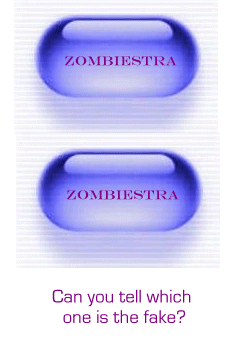

|
| weblog/wEssays archives | home | |
|
Can You Can Tell Which Pill Is Fake? (June 8, 2006)  My source inside global pharmaceutical giant Astra-Zastra tell me that
Chinese-based counterfeiting of the company's new hot-selling drug Zombiestra has
reached epidemic proportions, threatening the firm's sales, reputation and profitability.
My source inside global pharmaceutical giant Astra-Zastra tell me that
Chinese-based counterfeiting of the company's new hot-selling drug Zombiestra has
reached epidemic proportions, threatening the firm's sales, reputation and profitability.
The rep showed me two pills (pictured here) and asked me to select the fake one. They looked identical to me, and I said so. "They are identical," he fumed, "at least on the outside. Inside, the fake is just sugar and cornstarch. These pirated pills are killing us, absolutely killing us." The rep then referred me to some recent media reports which confirmed the dire consequences of massive drug counterfeiting in China: Counterfeiting in China (CNN transcript): MANN: I ask about that because at one point you wrote that in fact some of these drugs are so badly pirated that they could make people sick who think that they are going to benefit.The rep also asked me to read this report: Public Safety Jeopardized by Chinese Counterfeiters, Experts Say; Fake pharmaceuticals contradict notion of "victimless" crime. The problem, the Astra-Zastra source reported, isn't China's copyright and trade-secrets laws per se, but the enforcement of those laws, which is basically zero. He referred to this expert's explanation: MANN: China has been getting a lot of attention, and we've been devoting a lot of attention in this program, to intellectual property theft and copyright piracy. Does China deserve the blame it's getting?The rep complained that they've already closed their primary plant in China because sales had fallen. "People took our erectile dysfunction drug and nothing happened," he said, "because the counterfeit drugs were being wholesaled alongside the legit pills. Since no one could tell the difference, word-of-mouth blamed our product. Our brand's reputation went down the toilet, and so did sales." Even worse, the rep explained, fake Zombiestra pills are entering Canada in huge numbers, where they are passing into the hands of U.S. customers. "People who suffer from quatro-polar disease (please see The New Disease We Just Know You've Got) are actually feeling better taking the pirated pills," he said in great frustration. "They're nothing but sucrose and starch. It's killing our side-effects sales." The rep, who prefers to remain anonymous, leaned forward and spoke in a softer tone. "I don't need to tell you about Zombiestra's side effects, right? Bed-wetting, heart palpitations and road rage. I mean, road rage is getting hot; it's being touted now as the new syndrome, and we're really piling into this new market: road rage is a real disease." "Zombiestra is sort of a loss-leader for us," he explained. "The really big sales are on the follow-throughs, the meds to control the bed-wetting, heart palpitations and the road rage. Now that customers are feeling better on the pirated Zombiestra, and without the side effects, they're not ordering the follow-through meds. It's killing us, I mean really killing us. My commissions are way off, way off." The rep's mood darkened and he fell silent. Then he perked up and said, "but this new road-rage market, it's huge. We're gonna do gangbusters in that one." For more on this subject and a wide array of other topics, please visit my weblog. copyright © 2006 Charles Hugh Smith. All rights reserved in all media. I would be honored if you linked this wEssay to your site, or printed a copy for your own use. |
||
| weblog/wEssays | home |